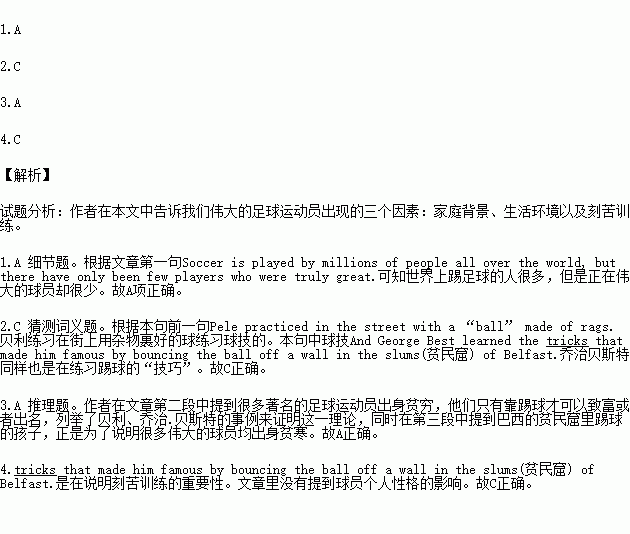题目内容
Soccer is played by millions of people all over the world, but there have only been few players who were truly great. How did these players get that way---was it through training and practice, or are great players “born, not made”? First, these players came from places that have had famous stars in the past---players that a young boy can look up to and try to imitate. In the history of soccer, only seven countries have ever won the World Cup---three from South America and four from Western Europe. There has never been a great national team---or a really great player---from North America or from Asia. Second, these players have all had years of practice in the game. Alfredo Di Stefano was the son of a soccer player, as was Pele. Most players begin playing the game at the age of three or four.
Finally, many great players come from the same kind of neighborhood---a poor, crowded area where a boy’s dream is not to be a doctor, lawyer, or businessman, but to become a rich, famous athlete or entertainer. For example, Liverpool, which produced the Beatles, had one of the best English soccer teams in recent years. Pele practiced in the street with a “ball” made of rags. And George Best learned the tricks that made him famous by bouncing the ball off a wall in the slums(贫民窟) of Belfast.
All great players have a lot in common, but that doesn’t explain why they are great. Hundreds of boys played in those Brazilian streets, but only one became Pele. The greatest players are born with some unique quality that sets them apart from all the others.
1.According to the writer, which of the following statements is true?
A. Soccer is popular all over the world, but truly great players are few.
B. Millions of people all over the world are playing soccer, but only seven countries have ever had famous stars.
C. Only seven countries from South America and Western Europe have ever had national teams.
D. Soccer seems the least popular in North America and Asia.
2.The world “tricks” at the end of Paragraph 2 is closest in meaning to ______.
A. experience B. training
C. skills D.cheating
3.The Brazilian streets are mentioned to show that ______.
A. a great soccer player may be born in a slum area
B. people in poor areas are born with some unique quality
C. children in poor areas start playing football at the age of three or four
D. famous soccer players live in slum areas
4.The writer mentions all the factors that may affect a soccer player’s success except ______.
A. his family background B. his neighborhood
C. his character D. his practice

